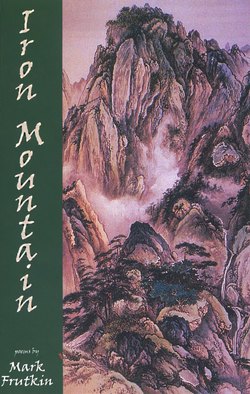Читать книгу Iron Mountain - Mark Frutkin - Страница 10
На сайте Литреса книга снята с продажи.
ОглавлениеThe Journey to Shu —A Chinese Landscape
1. A Horsehair Brush
The artist paints with a brush of horsehair
drawn from the horse he is painting.
Mountains and forests, ambiguous,
their folds spontaneous and immeasurable.
Ambiguous too the path
threading through them
like smoke
rising from a mountain hut.
At first it holds steady,
a solid stream,
then splays and shreds
in a thousand branches.
Why are we going to Shu? Remind me, the Emperor on his majestic horse questions his lieutenant.
To see the goddess, the lieutenant replies. The Emperor turns his head, shakes the reins, and the single-file procession stutters on through birch forests.
One day the weather is clear, the next, cloudy.
As the painting unfolds, so do the mountains,
so does the path through the mountains,
and so does the line of men and horses
on the path through the mountains.
Not even the painter knows
why they are going to Shu.
2. The Emperor Comes to the Wall
Deep in the chaos of mountains
the Emperor and his procession
come to a wall.
Like a snake
or a flickering tail
of lightning,
the wall twists along
mountain ridges
until it disappears to the east
until it disappears to the west.
The peasants they ask do not know
how far the wall goes
but believe it must end
two mountain chains beyond.
But they have never walked that far,
east or west.
The Emperor and his procession
follow the wall toward the setting sun
until they can ride no farther
and turn about.
On arriving at their starting point
they rest, then ride again
toward the rising sun
until they can ride no farther
and turn about.
When they have returned once again
to their starting point,
the Emperor is haunted
by the belief that
if he had kept on one day more
in either direction
he would have come to the wall’s end.
His lieutenant watches him rise
in his stirrups to gaze eastward,
then turn to the west.
His horse twists in a circle
unsure which way to go.
The Emperor sighs and waits
and does nothing.
The long procession of riders and horses
waits too, in silence.
He is waiting for a message from heaven.
The dusk descends and still they wait.
The wall twists and untwists
through knotted skeins of mountains.
No one moves.
Night comes.
3. The Emperor’s Poem
The iron mountain towers above us
robed in mist, its crags
reach through the clouds into heaven,
a single white waterfall seems
to thread down from the sky
in steps and fragments
and, like the trail behind us,
disappears the way we have come.
I see my lieutenant ahead
alone on his horse.
He reminds me of myself.
Though I am the greatest Emperor
the world has ever known,
the mountain towering above
was here before I came,
will remain when I have gone.
The first heavy rain will obliterate
our footprints and any sign of our passing.
In ten springs, a hundred, a thousand,
this path will remain the signature
of a traveller unknown, and the mist
will continue to swirl and dissipate
like poems breathed on air.
4. Chaos
Like the mountains that sweep before us,
fragmented and overlapping,
our world is in chaos.
My failure to bring order to my world
stings me and causes me distress.
I am the Emperor,
yet the world is an avalanche of sorrows
and I can do nothing.
Long ago I gave up searching
yet I ride on.
I take my ease in a poor man’s hut.
How is it my heart is soothed
by the sight of two wooden buckets
resting side by side in the doorway?
5. The Emperor Comes to the River
I have come through a storm
of mountains to find d9eGuan Yin,* high peaks and low valleys, my heart torn and contorted as the concatenation of cliffs, the constant rupture of planes.
All the streams have dissolved in the river,
twisted down from the mountains
and dissolved in the river.
The water flows without obstruction
like thoughts with no one attached to them.
*Goddess of Compassion
